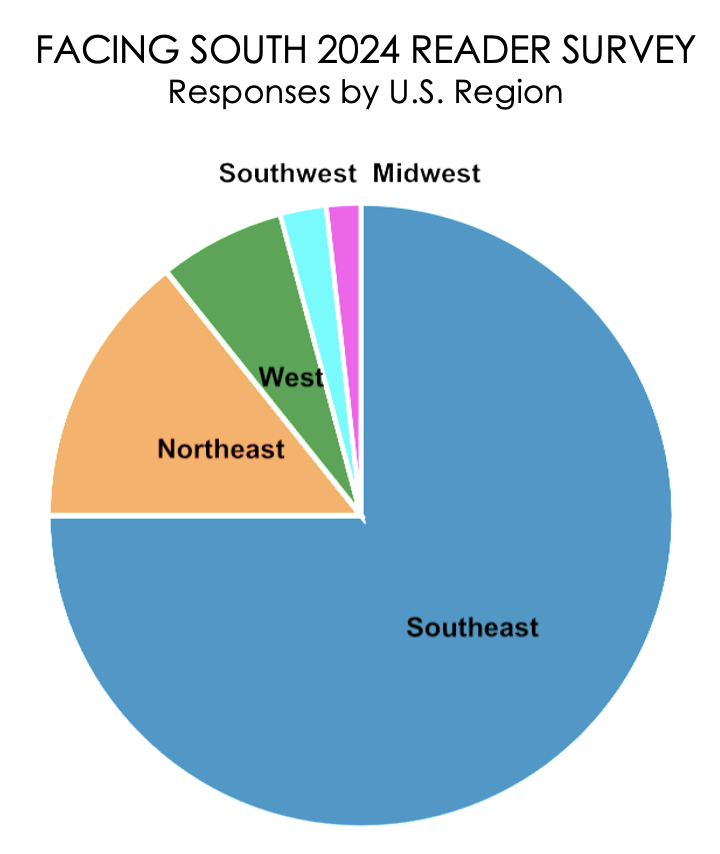What you told us: Facing South reader survey findings
Earlier this year, we asked you, our readers, to participate in a reader survey. Thank you to the many readers who responded; your thoughts were insightful and illuminating, and will be extremely valuable as we plan the future of Facing South in the coming months.
 We heard from readers in 27 states (and one in Canada!). Three-quarters of survey respondents were based in the South, while 14% hailed from the Northeast and 4% from the Midwest and Southwest.
We heard from readers in 27 states (and one in Canada!). Three-quarters of survey respondents were based in the South, while 14% hailed from the Northeast and 4% from the Midwest and Southwest.
You are loyal readers: More than 40% reported being readers of Facing South for five years or more, and 70% said they’ve been reading for three years or more. It’s heartening to see so many readers coming back and following our work over time — and also encourages us to explore ways to continue reaching new readers to expand our audience.
The four issues that survey respondents highlighted as especially important for the South today are democracy and voting rights, racial justice, environmental issues, and labor/workers’ issues.
When we asked what you like most about Facing South’s coverage, and what makes the Institute's journalism unique, readers offered a wide range of answers, but there were a few common themes:
Many of you said you valued our “groundedness” in the South – a rooted viewpoint in the region, which often challenges stereotypes. Readers said they like that we're “looking at the South’s issues by Southerners” and that Facing South “brings a seriousness to and an affection for the region that rises above caricature.” Another reader pointed to our “critical proud standpoint — taking on the issues of the South without throwing the South away, like many DC/CA/NY publications often do.” Or as another put it, “hard-core realities and history, not tourism.”
Readers also highlighted the depth of Facing South’s coverage, including investigative projects and Southern history. Many respondents pointed to our “deep dives” on issues and “in-depth reporting” as unique strengths, coverage that’s “not shallow, like most others.” Several especially valued our attentiveness to the South’s past in understanding the present — “contemporary with a look back,” as one described it. This holistic approach “actually addresses the unique circumstances that form the constraints, conflicts and concerns of the American South,” said another reader.
In an age when much media is dominated by hot takes, rants, and clickbait, readers told us they appreciate our commitment to informed, fact-driven journalism. Survey respondents said they valued our “real reporting! not just commentary” and “fact-based, clear and concise reports.” “The quality of the reporting/research” is a strength, said one reader; another finds our approach “thoughtful, calm, reasonable, well-researched.”
Many readers value having a place to turn for a progressive take on the South. As one said, our unique value is “tackling the biggest issues of our time from a Southern progressive perspective.” “Your point of view is realistic, supportive, and illuminating ... and progressive, which is becoming rare in the South,” another wrote. Specifically on analyzing the Southern political landscape, one reader said, “it’s hard to get Southern politics right, but you do."
And lastly, readers told us they valued the grassroots, “lower to the ground” perspective we bring, including stories highlighting the efforts of Southerners working for change. As a reader put it, “your coverage consistently centers the voices of working people, community members, and real for true movement leaders – not celebrity activists.” Another told us they value “learning about possible solutions.”
Going forward, when asked where you’d like to see us invest more resources in the future, the largest share – 40% – would like to see us expand our investigative reporting. Others expressed interest in fellowships for new journalists, expanding our coverage, holding events online or in-person, and opportunities to be more engaged on issues and causes.
Speaking of resources: About a third of you who responded donate to the Institute — thank you! As for those who currently don’t contribute, you offered some great suggestions for making support more appealing, including offering more original content and exclusive benefits for supporters.
And when asked what would make you more inclined to donate, 22% of you checked this answer: “Just ask! I value your work” — an invitation we’d be remiss to turn down. Will you support the future of Facing South with a donation today?
A special thank you to Natalie Griffin, Finance and Administration Manager at the Institute for Southern Studies, who compiled and analyzed our reader survey data.
Tags
Chris Kromm
Chris Kromm is executive director of the Institute for Southern Studies and publisher of the Institute's online magazine, Facing South.
